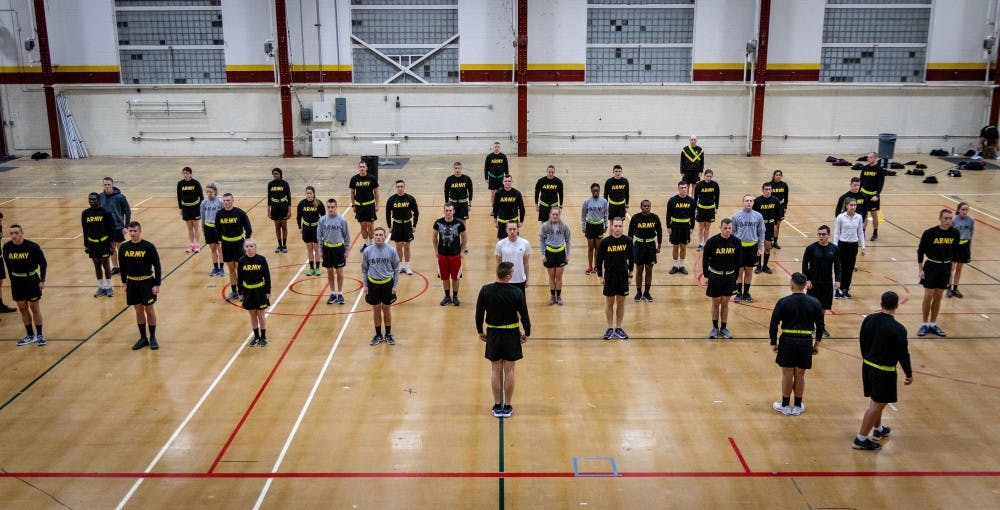Student and soldier: ROTC at Central Michigan University

During freshman orientation at Texas Christian University, Donald Pratt met the woman who would become his wife, Andy. She was a cadet in the University's Reserve Officer Training Corps (ROTC) program.
An 18 year old from Craig, Alaska, Pratt was pursuing a college degree on partial academic scholarship. Inspired by Andy’s experience, Pratt contracted into the ROTC his sophomore year.
Nineteen years later, he is Lieutenant Colonel (LTC) Donald Pratt, professor of Military Science at Central Michigan University. He oversees every cadet in the ROTC program from their admission to commission.
“The horizon you can see beyond as an 18 year old is so short,” said Battalion Commander Cadet Brock Crystal.
The senior from Barryton is the most senior cadet in the ROTC program. He is responsible for the unit of 101 cadets and anything they do – or don’t do. This includes supervising their bi-weekly physical training sessions, administrating paperwork and communicating as the middleman between cadets and LTC Pratt.
Crystal wakes up weekday mornings at 5:30 a.m. for different commitments. On Monday and Wednesday it's physical training with his fellow cadets. On Tuesday and Thursday it's personal training for a client at the gym.
He attends classes daily, tutors eight hours a week, completes administrative paperwork during free time and facilitates a weekly lab every Wednesday night for the entire program. Weekends consist of working at his internship as a personal trainer to benefit his exercise science degree. One weekend a month he participates in a military drill.
“We live in a world we have no control over. But to successfully chase down an abstract passion, we choose small manageable goals that we know we have control over and we take one step at a time,” Crystal said.
A college degree glimmers with potential and promises of personal freedom, but it also provokes a measure of anxiety about success in the future. This anxiety is only amplified by the high-stakes financial burden of rising tuition costs.
“I was that kid at 18 years old (thinking), 'If I don’t graduate in 4 years and make it all the way through on scholarship, and have no debt, then life is over,'” Crystal said.
For the average freshman, CMU estimates annual cost to the student at $24,036. Graduation with a bachelors degree at CMU requires a minimum of 124 credit hours. At $417 a credit hour, the smallest sum of money spent on a four year degree from CMU without any kind of scholarship is $51,708.
This number does not include room and board. According to Forbes, “The average student in the class of 2016 has $37,172 in student loan debt.”
“People in general have a fear of the unknown.” said LTC Pratt. “ For the Army and ROTC, as much of that struggle and fear we can take out is beneficial. It allows them to focus on becoming the leaders we know they can be.”
When contracting with the ROTC, a cadet accepts a four-year college scholarship that includes full coverage of tuition, a $1,200 book stipend per year and a $420 monthly stipend for monthly expenses. This is rewarded in exchange for four years of active duty in the U.S. Army or eight years in the U.S. Army reserve after the student graduates.
Last year the military spent roughly $19,000 per cadet at CMU.
“As I grew up and I learned more about leadership, I learned the great big unknown is actually just the rest of the world that we still live in," Crystal said.
Crystal will graduate in May and will continue his career in the Army before he pursues a career with his exercise science degree.
Loyalty, duty, respect, selfless service, honor, integrity, and personal courage are United States Army Values.
“One of the biggest things you can take away from leadership in general (and) specifically the ROTC program in teaching you how to lead in the context of war fighting, sustainment and the battle field (is that) everything is unknown," Crystal said. "To exist is to be in the unknown.”






